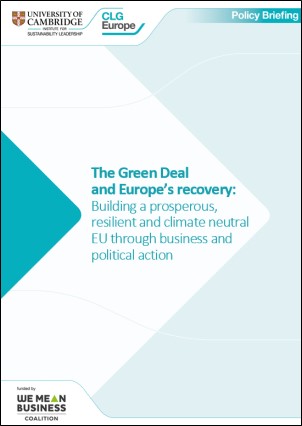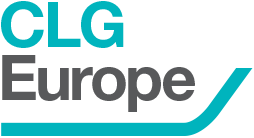18 June 2020 – The Covid-19 pandemic is confronting Europe with a deep health, social and economic crisis that is upending business-as-usual. Evidence shows that green investments can create jobs and kick-start economic activity while increasing its resilience in the long term. The European Green Deal can set the foundations for the transition towards a more productive, resilient and climate neutral European economy, including by enabling ambitious political and business action.
 Download the briefing
Download the briefing
The Covid-19 pandemic is confronting Europe with a deep health, social and economic crisis that is upending business-as-usual. The European Green Deal, described as “a growth strategy for Europe” when it was launched last year, is now even more relevant, and provides a template for how Europe’s economic recovery can be achieved. Green investments can create jobs and kick-start economic activity in the short term, while leading to a more productive, resilient and climate friendly European economy.
As the EU and national governments work to restart their economies, it is critical to build the foundations for the transition to a prosperous climate neutral economy. This briefing makes the case for greening the economic recovery and placing the Green Deal at its core. It sets out how political and business action in various areas can achieve Green Deal objectives and create a prosperous, resilient and climate neutral Europe. These areas include industrial innovation and a circular economy, clean buildings, energy and mobility, sustainable land use and nature, and a more sustainable financial system.
The briefing includes key recommendations for how the European Green Deal can serve as a blueprint for supporting the green transition and underpin Europe’s recovery efforts. It calls for the EU to:
- Maintain a high level of climate ambition and increase its 2030 for greenhouse gas emission reductions to at least a 55%;
- Scale up investments to support a green and just recovery;
- Create the enabling conditions to accelerate industrial innovation and a circular economy;
- Develop an integrated approach to clean energy, buildings and mobility to create jobs, reduce costs, accelerate decarbonisation and provide sizeable environmental and social benefits;
- Accelerate buildings renovation, the deployment of renewables and clean mobility;
- Achieve the objectives set in the EU’s Biodiversity and Farm-to-Fork strategies and steer investments in the real economy to move towards more sustainable land use and protect and restore natural systems;
- Strengthen financial regulation to manage risks, including through the renewed Sustainable Finance Strategy, and provide the right signals through the financial system to unlock green investments.
Ursula Woodburn, Head of EU Relations, CLG Europe, said:
"The European Green Deal is more relevant than ever in its vision of a greener, more stable, fairer and prosperous future. It should form the foundation of Europe’s recovery. To address the social and economic crisis from Covid-19 and achieve ambitious climate objectives, business and government actions need to reinforce each other supported by a financial framework that prioritises green investments."
Harry Verhaar, Head of Global Public & Government Affairs, Signify, and Chair of CLG Europe said:
"There is no time to lose as Europe deals with an unprecedented health and economic crisis and the long term risks associated with climate change. A resilient, inclusive and climate neutral economy is the only viable path for Europe’s economy and the wellbeing of its citizens. And the Green Deal provides us with a blueprint and toolbox for ambitious and swift government and business action. In 2050, when our (grand)children look back to 2020, they need to see that we acted decisively and boldly. We must do what is right for future generations."
Jesper Brodin, CEO Ingka Group (IKEA), said:
“We must not slow down nor back down on the ambitions of the European Green Deal. Now more than ever, we need to accelerate the transition to a green economy and make it work for both people and the planet. A recovery plan must ensure a vibrant, resilient and green economy, that is climate neutral.”
José Manuel Entrecanales, Chairman and CEO, ACCIONA said:
"Aligning financial flows with climate neutrality will increase the resilience of the financial system and the economy while avoiding future crises. The implementation of the European Commission’s new recovery plan is a case in point. It is now in our hands to create a double dividend or a double debt for the future."
Ignacio Galán, Chairman and CEO, Iberdrola said:
"Europe should continue to be at the forefront of global efforts to address the climate crisis, and the scope of the recovery plans outlined so far show an understanding that this leadership is even more urgent and necessary as we recover from the Covid-19 crisis. Ambitious policies to ensure economic stimulus is aligned with climate objectives will deliver real benefits for economies and society as a whole and promote innovation, and a solid R&D, as the grounds for the needed reindustrialisation of Europe . Now we must quickly establish clear and predictable frameworks to unlock the investment required. The resources, technology and knowledge to quickly drive a green recovery are already in place. ”
Martin Pei, Executive Vice President and CTO, SSAB, and Chairman of Hybrit Development AB, said:
"Europe’s economic recovery and longer term industrial policy should create a momentum to decarbonise heavy industry. Accelerating clean industrial innovation, like fossil-free hydrogen-based steelmaking, and creating low carbon markets for materials are crucial drivers of success in making Europe’s industry more competitive and put it on track for climate neutrality by 2050 at the latest."
Dimitri de Vreeze, co-CEO Royal DSM, said:
"We should not lose the opportunity to learn from the COVID-19 crisis and rebuild a better economy; we should not go back to normal but to a new normal. The new ways of collaborating for urgent solutions between governments and companies have been remarkable, and the potential to simultaneously catalyse the transitions needed for NetZero carbon economy through the stimulus measures designed to restart and reopen the economies must be seized. One of the key elements for Europe’s recovery, increasing its long-term resilience against challenges like climate change and resource scarcity, is to move towards a more circular economy, from circular product design to waste management. A political framework that supports the innovation and deployment of sustainable, low carbon materials, processes, and products will help to reap the associated economic, environmental, and social benefits and create jobs in the process."
This briefing has been issued by CLG Europe. CLG Europe is a select group of leading European businesses, with a membership representative of Europe in both geography and sector. CLG Europe members have come together to work with policymakers and business peers to support stronger ambition and effective, accelerated action on climate change within the EU and globally. The group’s work is aligned with the Paris Agreement and in support of the Sustainable Development Goals (SDGs).
The guiding mission of CLG Europe is to develop credible, ambitious positions amongst its membership and deploy effective strategic communications, thinking and action to engage with the highest levels of policy audiences and the wider business community. It acts to strengthen climate change policy and drive it into practice, both in Europe and, working with others, around the world. CLG Europe is convened by the University of Cambridge Institute for Sustainability Leadership (CISL).
We Mean Business is a global non-profit coalition working with the world’s most influential businesses to take action on climate change. The coalition brings together international non-profit organisations: BSR, CDP, Ceres, The B Team, The Climate Group, CLG, WBCSD. We Mean Business provided financial support for the publication of this report.
Citing this briefing
Please refer to this publication as University of Cambridge Institute for Sustainability Leadership (CISL). (2020). The Green Deal and Europe’s recovery: Building a prosperous, resilient and climate neutral EU through business and political action, Cambridge, UK: CLG Europe.





